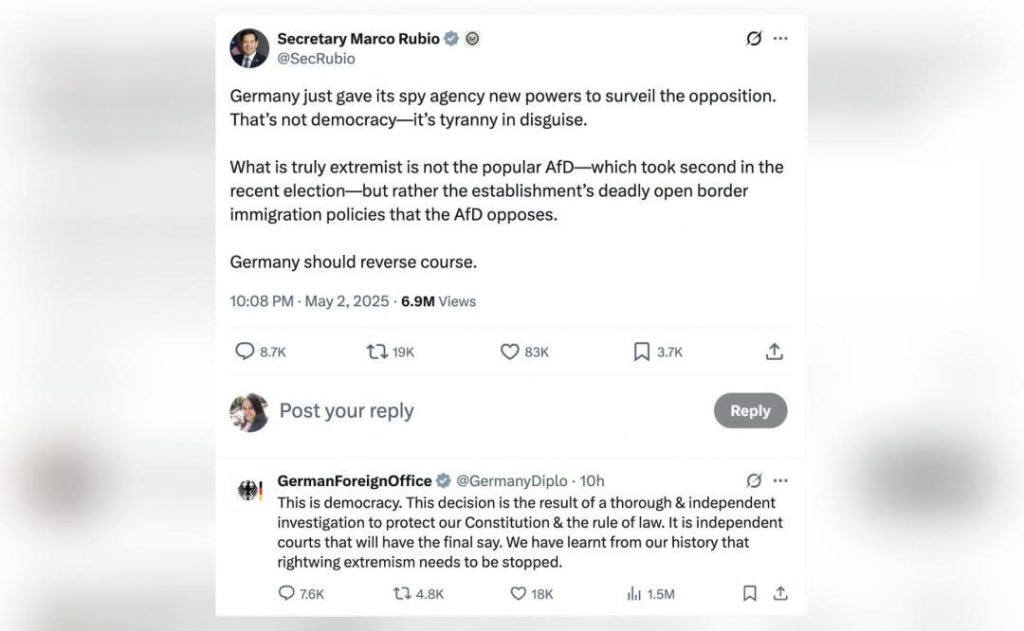
US Secretary of State Marco Rubio and German Government Clash Over AfD Party’s ‘Extremist’ Tag
In a recent development, US Secretary of State Marco Rubio and the German Foreign Ministry have engaged in a heated clash over the designation of the far-right Alternative for Germany (AfD) party as “extremist”. The controversy has sparked a debate about the definition of extremism and the role of governments in combating it.
The AfD party, which has gained significant popularity in Germany in recent years, has been accused of promoting far-right ideologies and anti-immigrant rhetoric. Germany’s domestic intelligence agency, the Federal Office for the Protection of the Constitution (BfV), has deemed the party as “extremist” due to its alleged ties to neo-Nazi groups and its anti-constitutional activities.
In response to the BfV’s designation, US Secretary of State Marco Rubio accused Germany of enabling “tyranny in disguise” by labeling the AfD party as extremist. Rubio’s remarks sparked a strong reaction from the German government, which defended its decision as a result of a thorough investigation to protect the German Constitution.
The controversy surrounding the AfD party’s designation as extremist is not new. The party has faced criticism from both domestic and international leaders for its alleged promotion of hate speech and anti-immigrant rhetoric. In 2019, the European Parliament voted to strip the AfD of its parliamentary immunity, citing concerns about the party’s ties to neo-Nazi groups and its alleged promotion of hate speech.
The BfV’s designation of the AfD party as extremist was based on an investigation that found evidence of the party’s alleged connections to neo-Nazi groups and its anti-constitutional activities. The agency claimed that the party’s ideology was “compatible with the ideology of the extreme right” and that its leaders had “close ties” to neo-Nazi groups.
In response to the BfV’s designation, the AfD party has denied any wrongdoing and accused the agency of political bias. The party’s leader, Alexander Gauland, has claimed that the designation is an attempt to silence the party’s opposition to immigration and multiculturalism.
Rubio’s criticism of Germany’s decision to designate the AfD party as extremist has been met with strong opposition from the German government. The German Foreign Ministry has defended its decision, stating that the BfV’s investigation was thorough and based on evidence of the party’s alleged ties to neo-Nazi groups.
In a statement, the German government said, “The decision regarding AfD is a result of a thorough investigation to protect our Constitution. We will not comment on individual opinions, but we will continue to work closely with our international partners to combat extremism and protect democratic values.”
The controversy surrounding the AfD party’s designation as extremist has sparked a broader debate about the definition of extremism and the role of governments in combating it. Many have argued that the BfV’s decision is a necessary step to protect German democracy and its values.
However, others have criticized the decision as an attempt to silence political opposition and stifle free speech. They argue that the AfD party has a right to express its political views, even if they are controversial or unpopular.
In conclusion, the clash between US Secretary of State Marco Rubio and the German government over the designation of the AfD party as extremist has highlighted the complexity of the issue. While the German government has defended its decision as necessary to protect its Constitution, Rubio has accused Germany of enabling “tyranny in disguise”.
The debate surrounding the AfD party’s designation as extremist is an important one, as it highlights the challenges of combating extremism in a democratic society. As governments around the world grapple with the issue of extremism, it is essential that they strike a balance between protecting democratic values and promoting free speech.



